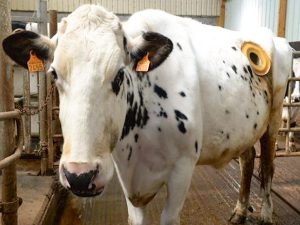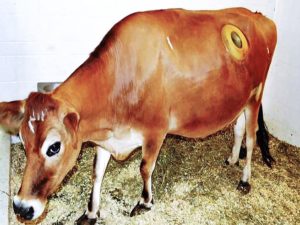Cow’s : During the fistulation procedure, the cow is numbed with local anesthesia. Once the surgery is done, the cow goes back to its normal activities, like eating. Cows are known as ruminants, meaning they have a four-chamber stomach. The largest compartment, called the rumen, contains beneficial bugs and bacteria needed to digest food. Sometimes, when bad bacteria enter the digestive tract or the good bacteria die, cows can’t digest food properly. That’s when fistulated cows can help.
In “rumen transplantation,” scientists can extract healthy gut bacteria and other microorganisms from the rumen of a healthy cow and transfer them into other sick cows to kick-start their digestive system. The fistulation technique has been used for over 100 years to study digestive processes in living animals.

However, an animal rights group has started an online campaign demanding authorities to ban a device, stating that its use symbolizes how animals are seen as mere machines for our use. Even though some argue that the surgery doesn’t harm the cows or shorten their life expectancy, the mutilation still requires a four- to six-week recovery period, during which the animals are undoubtedly uncomfortable. In a video released by the group, they urged the ministers responsible for research and agriculture to immediately prohibit experiments aimed at increasing animal productivity.
The animal rights group also added, “For Sanders and those involved in intensive livestock production, which is the norm in France, these animals are nothing more than production machines, considered as basic resources at our disposal.”

In response to the L214 complaint, Avril Group stated that this analysis is crucial for many advancements in breeding and, particularly, to improve the digestive health of millions of animals, reduce the use of antibiotics, and decrease emissions of nitrates and methane related to livestock. They mentioned that these cows are viewed as milk-producing machines that need to be optimized. Currently, dairy cows produce an average of 27 liters of milk a day, which is five times the daily requirements of a calf.
Ultimately, dear reader, you have the freedom to judge these processes as ethical or immoral, useful or harmful.
Also Refer : 10 Real Places On Earth That Seem Scientifically Impossible




